Meet the chef looking 'sharpe' on Cork’s culinary scene
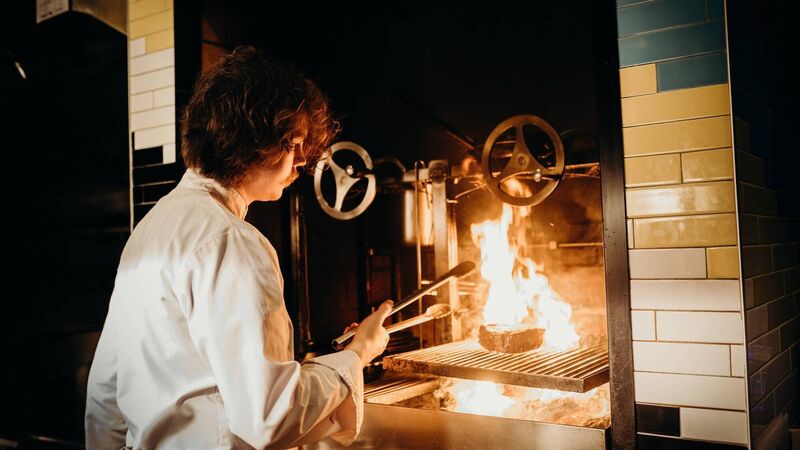
Harrison Sharpe, head chef at Elbow Lane.
WHAT do farming, ham, Berlin’s hopping food scene, pull-your-own-pints, an Irish country pub, and gourmet butter all have in common?
The answer can be found tending the embers inside Cork’s diminutive over-the-fire restaurant, Elbow Lane, in the shape of its head chef, Harrison Sharpe.
Originally from Waterford, Harrison, 30, grew up surrounded by a family immersed in food. Grandparents on both sides were farmers. On his maternal side, farming was paired with running a three-generation country pub and establishing Brady’s Quality Meats, known for their ham.
His mother paired life as a publican with a career as a development chef, and his father worked all his life in Waterford Crystal until the financial crash of 2008 shuttered the factory.
His parents now run Irish Gourmet Butter, continuing a butter-making tradition in the family going back four generations. Harrison uses this butter to baste and flavour every dish that leaves the pass to satiate the appetites of salivating diners. The potatoes and carrots used on the menu are from his grandmother’s farm in the coastal Waterford village of Ardo, delicately flavoured with a natural taste of salt from the sea.
In the mix are uncles who are chefs and bar owners; even Harrison’s own brother, Ronan, is a hospitality professional who recently joined Elbow Lane as its new General Manager.
Despite all evidence pointing to a career in food as the obvious path, it wasn’t always a clear cut one.
“I always liked cooking,” Harrison says. “All the family are really into food; I remember learning recipes and cooking with my mum – she’s an awesome cook, same with my aunts and granny.
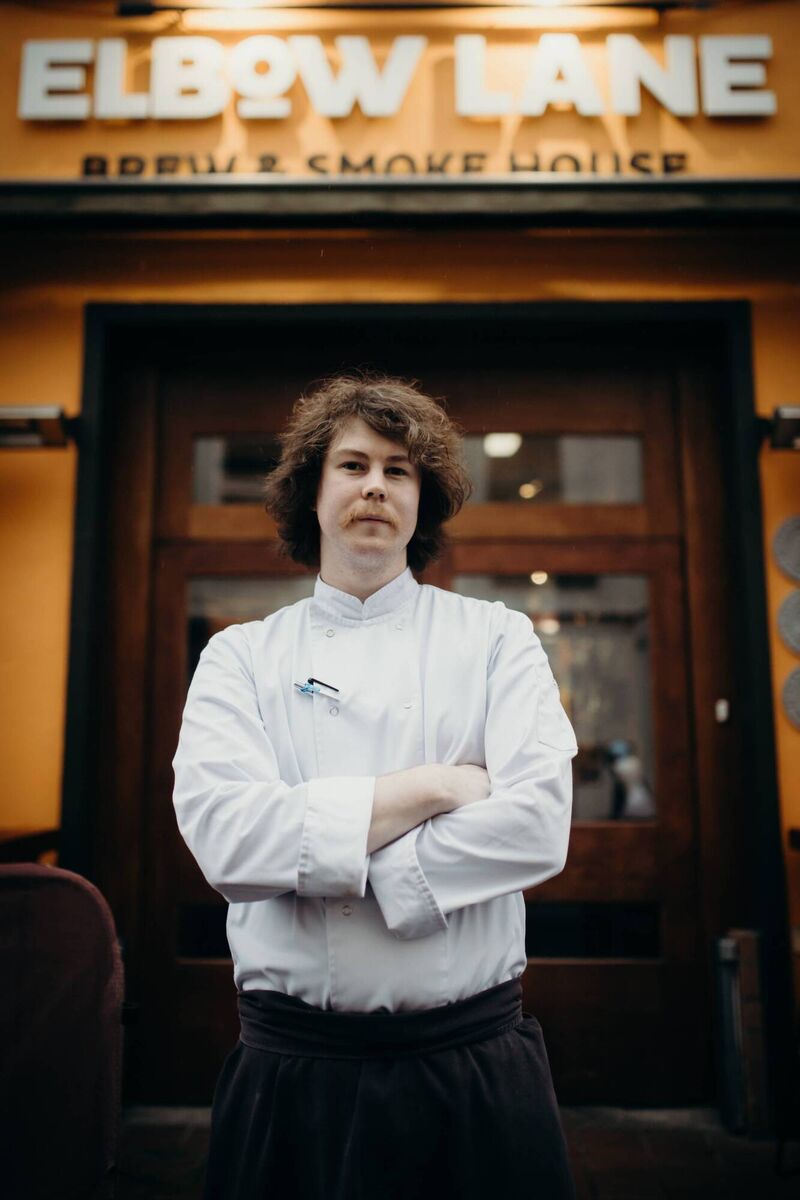
“I wanted to be a chef, and when I was 16, I did work experience at a restaurant. But when you’re that age you don’t want to work hard or do split shifts. I wanted to be getting up to mischief with my friends.
I parked cheffing for a while and lost what I wanted to do. I looked at architecture, interior design, carpentry – something to do with my hands; I like seeing a finished product that I can touch and hold.
When the financial crash hit and Harrison’s father lost his job at Waterford Crystal, culinary college was no longer an option because his parents couldn’t afford to support it.
“I moped around doing shifts in the pub. Eventually, mum said I had to get out of the house and do something, so I went over to my uncle who was living in Berlin and working as a chef.”
Harrison’s first Berlin sojourn was for just a couple of months, but it was enough to convince him that working in kitchens was what he wanted to do.
“I liked watching my uncle look at what ingredients he had in his fridge and make something that was always delicious.
I thought I at least want to learn how to cook properly.
Harrison headed back to Ireland, and moved to Cork to begin a two-year culinary course at the then CIT. But although the desire for the culinary profession was there, discipline was missing.
“I was having a lot of fun enjoying college life, maybe not doing as much of the school side. I got through the first year, but I could have done so much better.”
After the summer, Harrison transferred to WIT to complete the second year, and met two mentor-chefs who completely changed his outlook: Michael Quinn and Tony Barry.
“They really knew how to wake you up,” he says. “I was 20 and was still a little sh*t, but they just knew how to get the best from you. When someone else is really passionate for what they do, they make you stand up that bit straighter and make you feel like you want to be like them. That’s what I think about this career now - it’s a profession.”
After graduating, Harrison made a beeline back to Berlin, working in restaurants such as Salt and Bone learning the craft of nose-to-tail animal cookery, and later the tiny kitchen of Gal Ben Moshe’s first restaurant, Glass, cooking up Middle Eastern fine dining cuisine and working long weeks.
After a year, Harrison was burnt out working relentlessly to exacting standards in a pressured environment. But Berlin wasn’t done with him yet, and he stayed working side hustles at an uber-trendy regular street food festival called Bite Club.
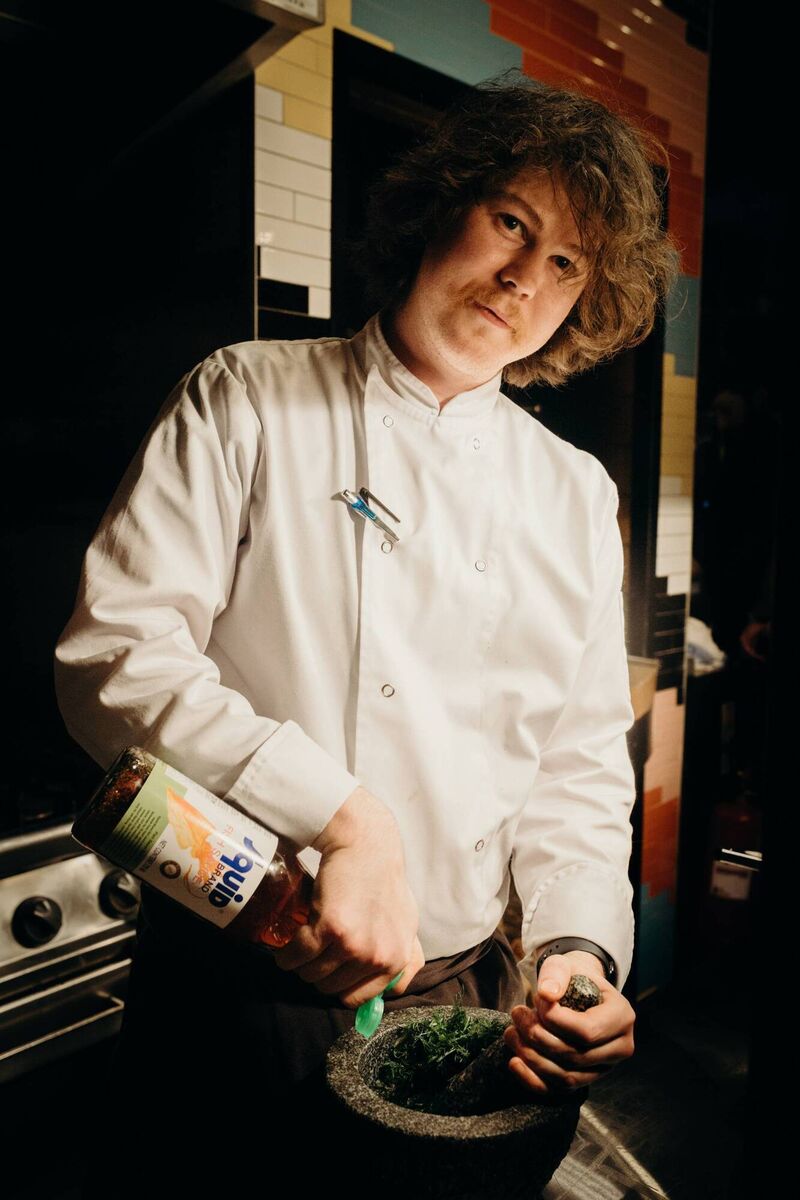
“It was really class. Thai BBQ, Jerk Chicken, Korean Fried Chicken; loads of crazy variety all in one place for a day. I went freelance, working for a lot of the stalls being their chef for the night.
“I was pretty decent by that time, and knew what people needed. They were long days, but I learned a lot of different cooking styles; it was fun, summers in Berlin are awesome, and it paid well.”
After two years in Berlin, in 2015 Harrison headed back to Cork.
“I found the opening at Elbow Lane and met with Stephen Kehoe. I remember thinking just how clued in and professional he was. He really made me want the job, and he reeled me in! Stephen is far and away the best chef I’ve ever seen.
I’ve worked with a lot of great chefs, but he is the whole package; he’s a restaurateur, businessman, mentor and a good person.
“I thought Elbow Lane looked cool and it was the exact opposite of the precise technical cooking I had done in Glass. Elbow Lane is pure analogue cookery - cave man cooking over fire! Fermentation was getting big then, and everyone was really into craft beer as well, so I thought I’d give it a year here and then maybe look at something else. I’m here six years now!”
One year turned to two, working shoulder to shoulder with Aishling Moore. When she left to open Goldie, Harrison was offered the opportunity to step up as head chef of Elbow Lane.
“I decided to double down and stay. I love this place and I couldn’t pass up the opportunity. Market Lane Group is a great company to work for, Stephen’s a great mentor, I’d learned so much here, why shouldn’t I stay a bit longer.”
As Elbow Lane’s new head chef, Harrison’s instinct could have propelled him to do something radically different from what had been before. But the restaurant’s clientele is loyal and come loaded with expectations.
“Getting definition was hard for the first six months. I changed a couple of things, but the more I evolved, the more confident I got, the more I understood what that definition is and isn’t,” explains Harrison.
“When Goldie opened, it got so much acclaim it almost blacked us out. But that was a great thing because I was able to figure it out myself without dealing with external factors, like critics coming in.
“Now, I’m very confident in what we do. I know where the restaurant should go, and how our food here is defined through my lens. At the start, I was trying to think, what would Stephen do or what would Aishling do, but dishes won’t sing the same way when it has your own personality and technique put into it.”
These days, he is confidently asking ‘What Would Harrison Do?’, and the response is a laser focus on quality and honing the craft of managing flame, fire and ember.
We’re cooking over a wood grill which changes throughout the night, what wood is used, who’s cooking it.
"Because we’re so good at that, if we want to be the whole package as a restaurant, we apply that to the meat, fish, and veg, and we must curate those relationships with our suppliers in the same way.”
Vegetables feature throughout the menu, and although Harrison will always try to increase the number of veg-forward dishes, ultimately Elbow Lane will never be a vegetarian restaurant. The focus is on sourcing the best quality meat and fish, because that is what the customer expects.
“If you asked me when I was 25, I would have said I’m just doing this for me, that’s it, and if customers don’t like it, they can go somewhere else. But this is hospitality which means we have to be hospitable to people. We do as much as we can to give customers a great experience that also works for me, my staff, and makes everyone proud of what we serve.”
Even so, there is always room for experimentation, and having a micro-brewery right next door helps with finding new ingredients and flavours to play with.
The brewery uses barley, yeast, hops and water to make beer, but the brewing process creates waste by-products. Brewer’s spent grain has been turned into a kind of soy-sauce or dried out and used in breads, or collected and fed to pigs that one day will return as a dish on the menu.
“Hops are very interesting. They’re extremely bitter but also have fruity, citrus, pine-y flavours. Putting hops into vinegar and aging it gives you something unique,” says Harrison.
“It’s cool to play around with wort (unfermented unhoped beer). We use it to cook mussels, throw loads of salt and herbs in to poach our potatoes, and reduce it down to a honey consistency that we use as a dressing. We use the finished beers to make batter and steam our ribs in after they’re cooked.”
Heston Blumenthal and Ferran Adrià were renowned for their ability to apply scientific method to cookery, creating culinary movements such as molecular gastronomy and manipulating senses to reframe how we experience dishes. This approach to cuisine has always fascinated Harrison, and he is currently studying for a Diploma in Food Science and Technology at UCC to explore this more.
“It’s something I’d always wanted to do,” he says, glinting at the idea of a crazy experimental food lab. He hints at a new venture within Elbow Lane that will support the restaurant groups’ commitment to reduce waste and turn would-be waste into new foods with exciting flavours.
In 2024, Harrison will lead Elbow Lane’s tenth birthday celebrations with his brother, Ronan, by his side.
“Working with a sibling means that your patience is never-ending,” says Harrison.
You both share the same goals and want the business to succeed, and being able to trust each other implicitly makes running a business so much easier.
Elbow Lane is open daily, 5pm – 10pm. Online bookings and walk-ins welcome. www.elbowlane.ie
Next week, Kate Ryan chats to Jack Bell who is behind the newly opened Jacks at Pilgrim’s Rest.

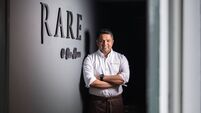
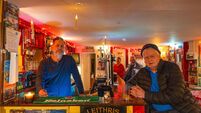




 App?
App?


